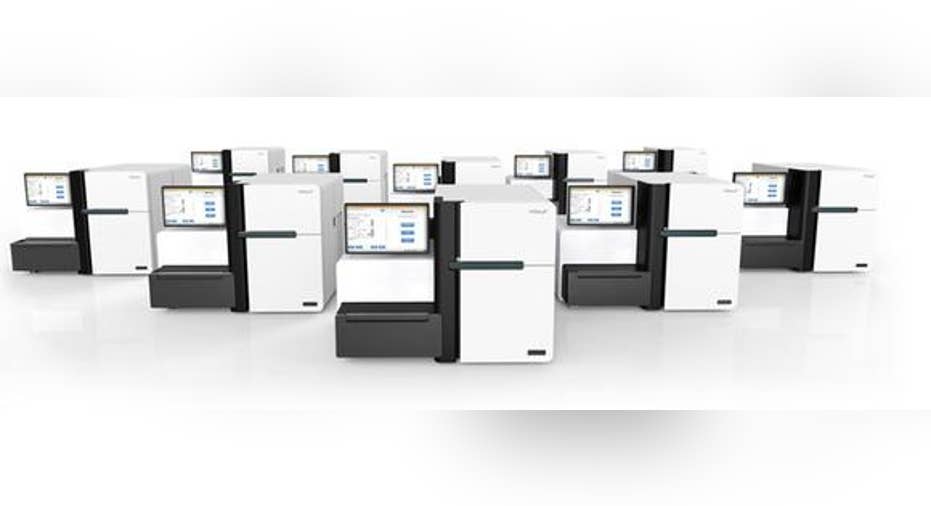Is Pacific Biosciences or Illumina Corp. a Better Buy?

SOURCE: ILLUMINA CORP.
After reporting preliminary sales figures that were south of industry watchers' forecasts, shares in gene-sequencing giant Illumina Corp. toppled this week. Meanwhile, better-than-anticipated sales at Illumina's smaller rival, Pacific Biosciences , caused that company's shares to pop. Is this upstart challenger a better buy than industry Goliath Illumina?
The numbersBy all measures, Illumina Corp. is the industry leader in gene sequencing and will remain the leader for the foreseeable future.
Researchers have deployed over 7,500 Illumina gene-sequencing machines globally, and demand for sequencers and the consumables necessary to run them generated $2.2 billion in sales for Illumina last year alone.
For comparison, Pacific Biosciences is tiny. The company came into 2016 with just 160 of its gene sequencers in the field and only $93 million in sales in 2015, a large chunk of which was amortized payments from Roche Holdingsfrom a collaboration deal.
The gap separating these two companies widened in Q1, too. In spite of disappointing investors with their preliminary numbers, Illumina still expects to deliver $572 million in sales last quarter, and that dwarfs the $19.1 million in first-quarter revenue Pacific Biosciences reported on April 21.
Battle brewingWhile Illumina is firmly seated on its perch, there are some signs that Pacific Biosciences could be mounting a much bigger challenge to it now than it has in the past.
When Illumina reported that its first-quarter revenue grew 6% versus a year ago, or 4% less than what people were modeling, it cited a slowing in Europe as the reason. Sales of Illumina's sequencing machines and consumables in Europe are growing by only the low to mid-single digits, far south of the mid-teens growth rates Illumina is enjoying in Asia and the Americas. The reason behind this lower growth was said to be a greater-than-expected amount of machine sharing between European researchers.
Because Illumina highlighted Europe as a drag on sales, analysts were quick to ask Pacific Biosciences during its recent earnings conference call how its business was there. Pacific Biosciences CEO Mike Hunkapiller responded by saying the company had a "very good quarter in Europe, both in Q1 as well as Q4." Susan Barnes, Pacific Biosciences' CFO, also chimed in, saying that "the pipeline was strong for Europe as well."
Illumina didn't say that it's losing sales to competitors in Europe, but Pacific Biosciences' response does rasie questions about whether Illumina's sluggish demand in Europe is tied to both machine sharing and increasing competition.
SOURCE: PACIFIC BIOSCIENCES.
Slow but steadyIf Pacific Biosciences is making inroads against Illumina, it's because of its recently launched next-generation sequencing machine, the Sequel.
The Sequel replaced the company's RSII model, a machine for which Pacific Biosciences received just 40 orders in 2014. Management rolled out the Sequel last fall with a price tag of $350,000, roughly half the RSII. It also bumped up Sequel's performance so that it can produce longer reads that researchers find valuable.
As a result, Pacific Biosciences recorded orders for 49 Sequels in the fourth quarter, and it tacked on orders for another 30 Sequels in the first quarter. That may not be Illumina-sized numbers, but it's clearly a big advance over the number of orders that Pacific Biosciences was notching for the RS II.
Pacific Biosciences also says it's rolling out the Sequel slowly to insure that there aren't hiccups when customers turn it on. It's not 100% clear what that means for the pace of installs for the remainder of this year, but if we assume that the rollout will continue to build, then 2017 could be a very important year, especially as a larger install base begins translating into higher consumables revenue.
Advancing the industryIllumina has by far the broadest and most complete lineup of gene-sequencing machines, and that leadership is allowing it to focus increasingly on projects that may expand the overall gene-sequencing market.
To that end, Illumina CEO Jay Flatley has announced two "moonshot"-style businesses. The first is Helix, a consumer-focused company that's building a technology warehouse to store millions of people's genetic data. Helix plans to tap that data by running an app store that allows developers to make gene-specific apps that consumers can purchase.
Earlier this year, Flatley also announced Grail, which is leveraging Illumina's deep sequencing expertise to create a next-generation diagnostic tool for cancer detection. If Grail can identify circulating tumor DNA and find cancer sooner than current tools can, then it could someday serve as a cancer early warning system that becomes a standard of patient care.
Looking forwardThe market for gene sequencing is not shrinking. And it's going to get a lot bigger as researchers increasingly discover how to merge genetic information with personalized medicine. It's hard for me to think that Illumina's massive lead and deep pockets won't allow it to benefit tremendously from that growth over the coming decade, but there could be room for other players in the market, and for that reason, Pacific Biosciences shouldn't be ignored.
Overall, Illumina's large installed base, R&D depth, balance sheet, and profitability make it the better of the two investments for most investors. However, investors who can tolerate the high risk of owning Pacific Biosciences and endure its ongoing losses might want to consider it, too.
The article Is Pacific Biosciences or Illumina Corp. a Better Buy? originally appeared on Fool.com.
Todd Campbell has no position in any stocks mentioned. Todd owns E.B. Capital Markets, LLC. E.B. Capital's clients may have positions in the companies mentioned. The Motley Fool owns shares of and recommends Illumina. The Motley Fool recommends Pacific Biosciences of California. Try any of our Foolish newsletter services free for 30 days. We Fools may not all hold the same opinions, but we all believe that considering a diverse range of insights makes us better investors. The Motley Fool has a disclosure policy.
Copyright 1995 - 2016 The Motley Fool, LLC. All rights reserved. The Motley Fool has a disclosure policy.



















